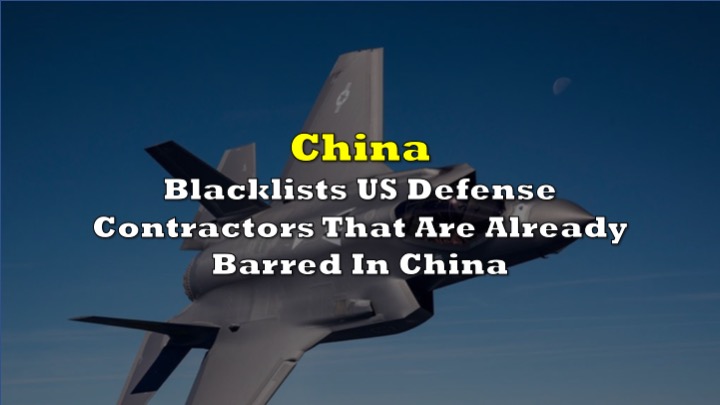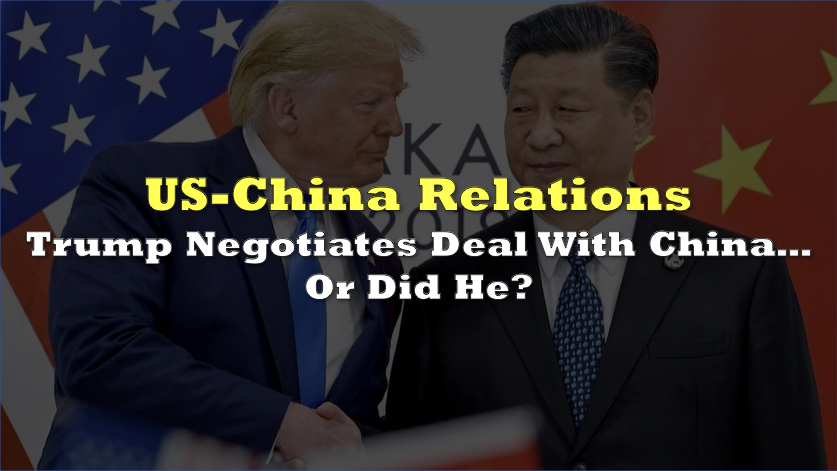In an effort to make it look like its doing something, China announced Thursday that it had banned Lockheed Martin (NYSE: LMT) and a subsidiary of Raytheon Technologies (NYSE: RTX) due to their military sales to Taiwan. Adding the corporations to its “unreliable entities list” prevents them from engaging in China-related export and import activity.
Lockheed Martin and Raytheon Missiles and Defense will be unable to do trade with China or make new investments in the nation as a result of China’s current sanctions, announced by the Chinese Commerce Ministry. China has also prohibited senior executives from entering the country or acquiring a work permit.
China adds @LockheedMartin and @RaytheonDefense to its unreliable entities list over (some) arms sales to Taiwan
— Morgan Brennan (@MorganLBrennan) February 16, 2023
Note: the sanctions seem specific
to Raytheon’s Missiles and Defense biz – *not* the aerospace units that are also suppliers to commercial aircraft$LMT $RTX
The Chinese ministry also announced that it would levy sanctions on the two businesses equal to twice the value of the armaments sold to Taiwan since September 2020.
The sanctions follow Washington DC’s blacklisting of six Chinese businesses it claimed were linked to Beijing’s surveillance-balloon program after the US shot down one that had crossed the border. In recent years, the United States has imposed sanctions on an expanding number of Chinese technology businesses as well as institutions linked to China’s military.
China would take countermeasures against US firms that threaten its sovereignty and security, said Wang Wenbin, China’s Foreign Ministry spokesman, at a regular press conference on Wednesday, alluding to US sanctions imposed on Chinese companies in connection with the balloon incident.
But… they’re already banned
China had already sanctioned Lockheed Martin and Raytheon Technologies, the parent firm of the missiles and defense unit, as well as Raytheon’s CEO, in Feburary last year over a $100-million arms sale to Taiwan. China’s foreign ministry at the time said the sale “undermined China’s security interests, seriously undermined China-U.S. relations and peace and stability in the Taiwan Strait.”
The recent move is said to be more of Beijing’s posturing and is expected to have a limited impact because US defense corporations are also generally prohibited from selling military equipment to China.
These two firms have already been under sanctions since last Feb. from China ..(if this is a veiled response to the balloon, fairly innocuous)> $LMT $RTX China imposes sanctions on Lockheed Martin, Raytheon over Taiwan arms saleshttps://t.co/ZVRAT8gHhy pic.twitter.com/nu0yb5Sv2q
— Tracy (𝒞𝒽𝒾 ) (@chigrl) February 16, 2023
So, China sanctioned US weapon manufacturers, who are already banned by the US from selling weapons to China.
— SmallCapSteve (@smallcapsteve) February 16, 2023
This is like me putting out a news release that I will no longer be having sex with Megan Fox! pic.twitter.com/YLMDwaN89b
Earlier in September, Chinese embassy spokesman Liu Pengyu asserted the mainland’s sovereignty over Taiwan as it called out the United States for its then-proposed $1.1 billion arms sale to the self-governing island.
“The United States interferes in #China’s internal affairs and undermines China’s sovereignty and security interests by selling arms to the Taiwan region,” Liu said on Twitter.
The spokesperson added that the proposed deal counters “international law and basic principles in international relations,” as well as violates the People’s Republic of China’s view of a one-China policy.
“China will resolutely take legitimate and necessary counter-measures in light of the development of the situation,” Liu added.
China’s actions comes at a time that its relationship with the US is getting more tenuous after the two countries trade blame and accusations regarding sending spy balloons to each other’s airspace.
Information for this story was found via The Wall Street Journal, Reuters, and the sources and companies mentioned. The author has no securities or affiliations related to this organization. Not a recommendation to buy or sell. Always do additional research and consult a professional before purchasing a security. The author holds no licenses.









